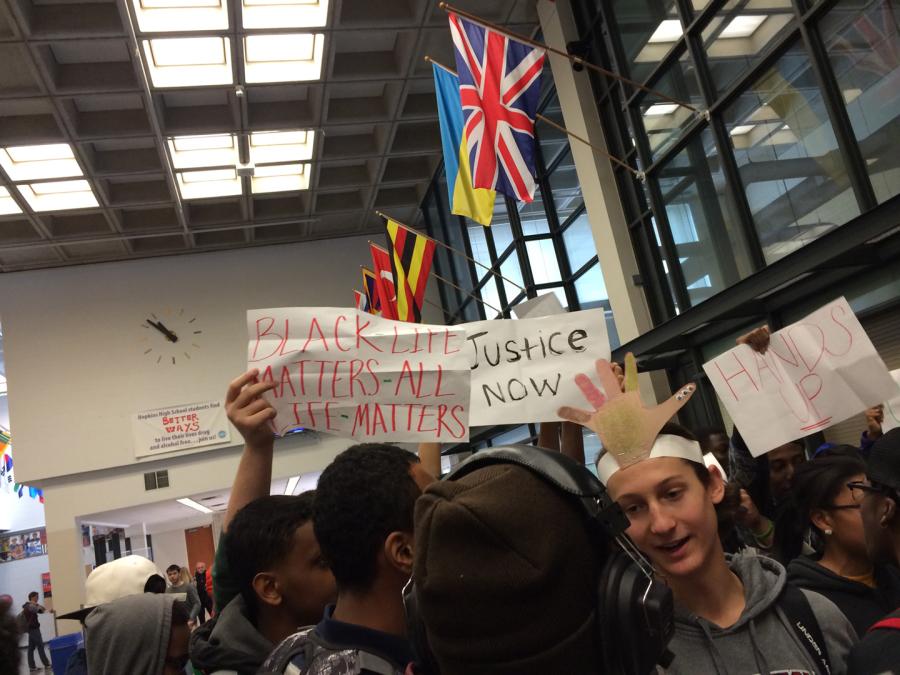No, you can’t say the n-word
Recent language on social media serves to undermine community.
Race is not a new discussion among students. This photo is from the Hands Up Don’t Shoot protest about the Ferguson trial held in the mall last November.
Mar 26, 2015
We can all name many racial slurs we have heard throughout our lives. All are offensive, and all attempt to encapsulate diverse cultures and individuals under a single descriptor.
However, only of one them can be heard on a daily basis at HHS.
The N word has caused fights at HHS, both virtual and physical. It is not the term itself behind the controversy, but the students who choose to use it.
Many black students complain of hearing their peers use the word on Snapchat or Twitter. Recently, there was an issue where a black student posted a snap of a white student who used the N word as his caption.
Bianca Williams, senior, took exception and responded to the student. She believes non-black students shouldn’t use the N word.
“When white people use the word it’s a symbol, or a reminder of the deep privilege they once held over us [African-Americans],” Williams said. “They may see it as harmless, but so did their ancestors.”
To blindly use it is beyond disrespectful to not only students at HHS, but an entire culture.
African-Americans took a degrading word and gave it meaning. This is called linguistic reclaiming, or semantic looping. In an essay, Andrew T. Jacobs, a professor at Rockland Community College, discussed why African-Americans appropriated the N word.
“The African-American usage of ‘n***a’ is a strategy for asserting the humanity of black people in the face of continuing racism, a strategy that celebrates an anti-assimilationist vision of African-American identity,” Jacobs wrote.
Despite the use of the word in the African-American community, the word can still be used by others to degrade black people. It is not okay for white students or even students of color to use it simply because they cannot empathize with or relate to what the word represents.
In a recent debate on CNN, Marc Lamont Hill, a professor at Morehouse College, explained why the word is not intercultural.
“I might see Trinidad James on the street and call him ‘my n***er.’ You know why? Because he is my n***er. And the difference between Trinidad James and you, is that Trinidad James has to deal with the same oppressive situations, he’s born to a world where anti-black racism prevails, he lives in a world where police might shoot him on the street no matter how much money he has – we share a collective condition known as n***er,” Hill said. “White people don’t.”
That is why women can call other women b**** or gay people can call other gay people queer.
For me, the N word is a symbol of brother or sisterhood. Though I don’t like being referred to by the N word, I tolerate it when it’s coming from someone in my culture.
The power is not in the word, but in the person behind it.
For a non-black person to refer to me as the N word is scary. They are in the position to offend me, to deny me of my humanity, to hurt me. The worst part is that no matter what version of the word they use, they can still do these horrible things.
Yes, the N word may have developed into a slang term, but that does not make a difference. Slang is just an informal way of saying the same thing. Keep in mind that the term ‘n***a’ derives from the south, which is known for its heavy use of jargon.
While students at HHS debate its role in culture, there is no denying that for some it has been used as an instrument of hate.
Dr. Stanley Brown, equity coordinator for Hopkins Public Schools, can vividly remember being told, “N—er, get to the back of the bus.”
And while Brown believes no one should use the N word, he understands why black students take exception to non-black students using the word.
“I think that if people began to realize the painful history of the word, they would be able to understand why African-American students at HHS specifically do not appreciate their peers using the word,” Brown said.
There can be instances where a black student is okay with anyone using the N word, and that opinion should also be respected.
JaMichael Ellis, junior, does not have a problem with non-black students using the N word.
“I think it’s just a word,” Ellis said. “As long as they use it to mean ‘my guy, or my n—a,’ I don’t really care if they use it.”
Though many African-Americans agree with Ellis’s view, never assume that someone is okay with it. Asking before you use the word is the most appropriate thing to do.
And because one black person allows you to use it, does not mean that the black person five feet away is okay with it.
HHS is a diverse community full of talented, intelligent and inspirational students. We are so great because we are able to interact with and respect each other. To prevent future conflicts, I suggest that non-black students do not use the N word at HHS.
Or on social media, or any platform where you can offend people that look like me. Or, how about you just don’t use it at all.

